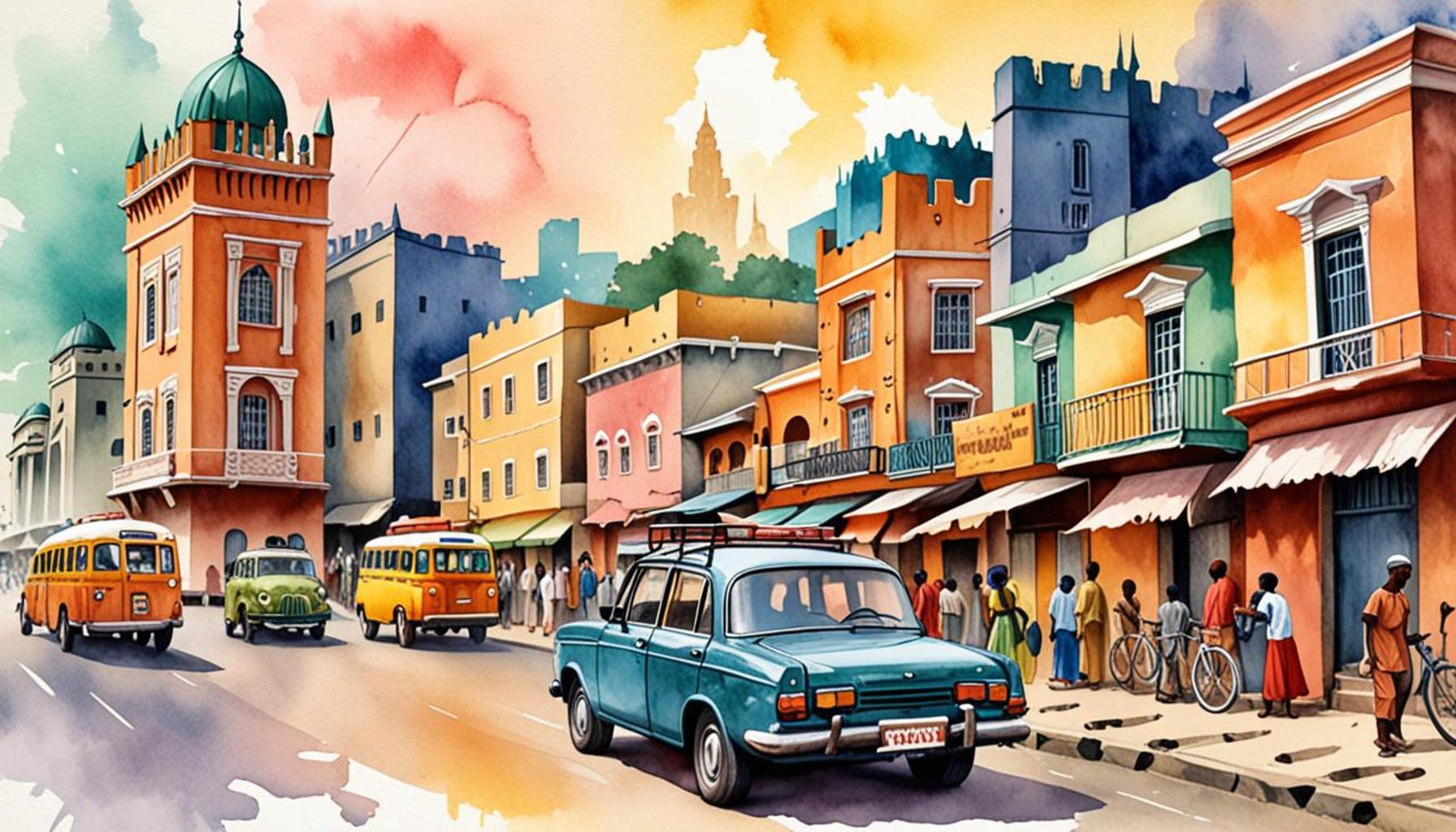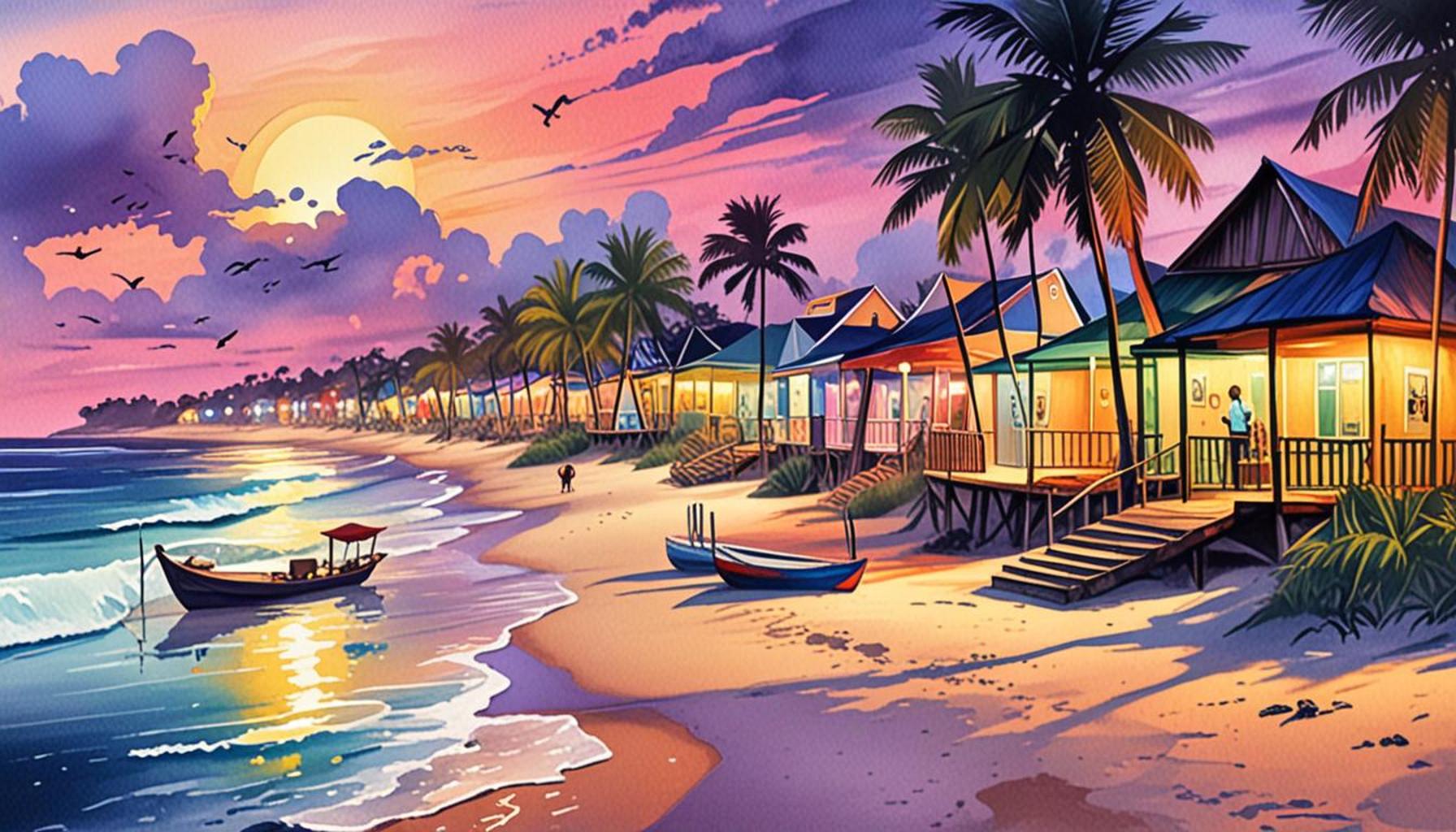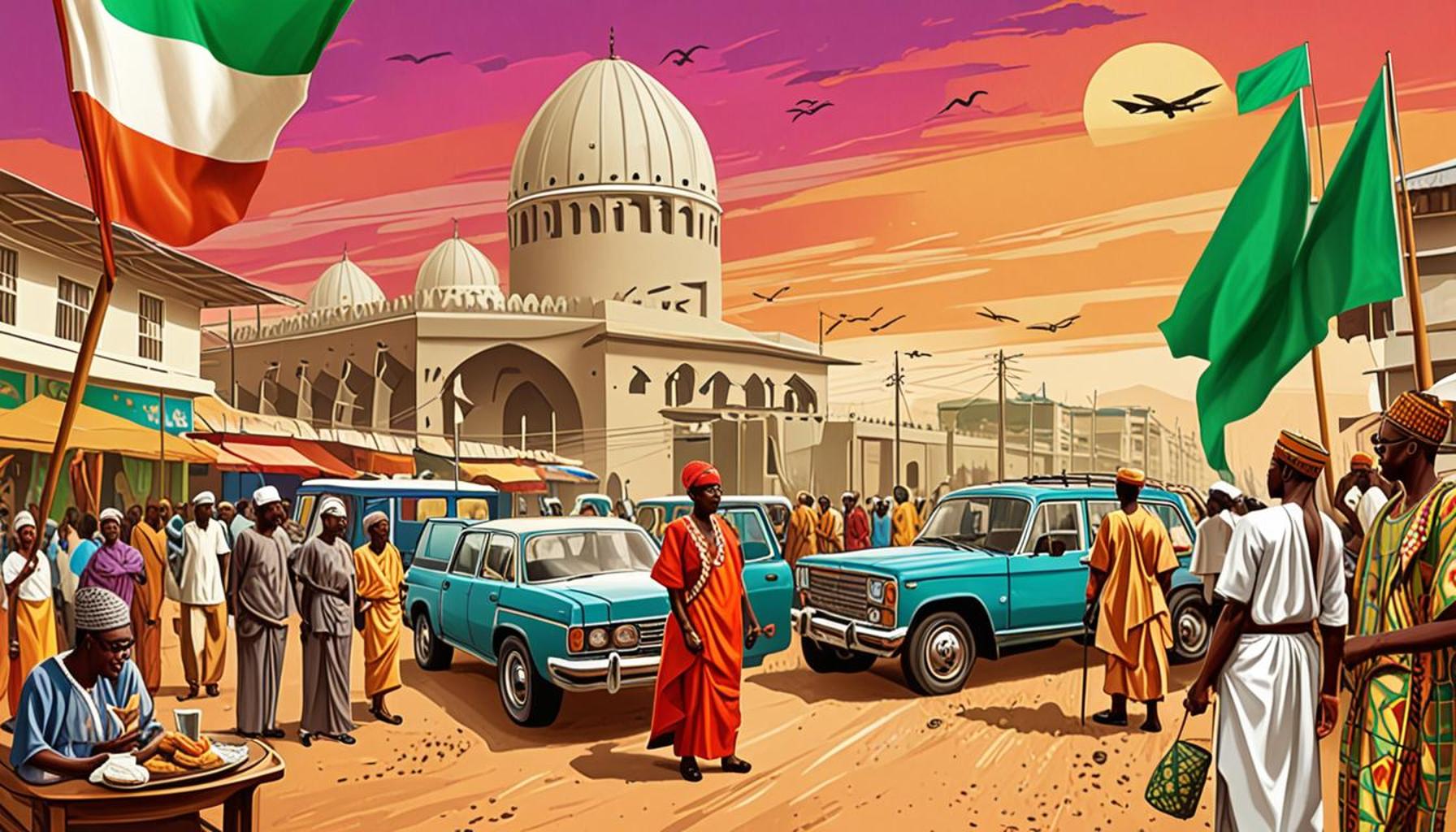Towards the Niger Delta: Discovering the Culture and Traditions of Riverine Communities

Discovering the Secrets of the Niger Delta
The Niger Delta region is a mesmerising landscape where lush greenery meets a labyrinth of waterways. This region is not only known for its ecological significance but also for the vibrant cultural identity embodied by its people. Home to ethnic groups such as the Ijaw, Itsekiri, and Urhobo, the Delta showcases a rich cultural legacy influenced by centuries of traditions and interactions with nature.
As you explore this enchanting region, several facets of local life stand out:
- Rich Cultural Practices: The Niger Delta is alive with a plethora of festivals that celebrate its culture and heritage. Events like the Eyo Festival in Lagos, although primarily associated with the Yoruba, has its parallels in delta regions, emphasizing masquerade as a form of expression. Traditional attire, such as the intricate beadwork of the Itsekiri and the vibrant men’s wrapper of the Ijaw, narrate stories of heritage passed through generations. Their folklore is equally fascinating, with tales often revolving around the spirits of rivers and the land, reflecting the community’s deep spiritual connection to nature.
- Traditional Livelihoods: The daily lives of the riverine communities are deeply intertwined with the waters of the Delta. Fishing remains a vital aspect, with artisanal methods passed down through generations ensuring sustainability. Moreover, the production of palm oil, which has its roots here, has been a staple for both local consumption and export, fostering economic stability. Craft-making, particularly the weaving of baskets and brightly colored cloths, highlights the craftsmanship of local artisans, creating economic opportunities while preserving cultural identity.
- Unique Cuisine: The diverse culinary scene in the Niger Delta is a reflection of its rich agricultural resources and the cultural background of its inhabitants. Dishes like jollof rice, richly flavored with local spices, and pepper soup, often made with fresh fish or meat, showcase the innovative fusion of ingredients. Local delicacies such as catfish in tomato sauce are popular, embodying the freshness of the Delta’s riverine bounty.
However, the Niger Delta is currently grappling with multifaceted challenges. The region faces environmental issues due to oil spills and gas flaring, which threaten its delicate ecosystems. Social inequalities and economic struggles further complicate life for its inhabitants, often leaving them in a state of vulnerability. This stark contrast between the deep-rooted resilience of culture and the pressing contemporary challenges creates a complex yet compelling narrative.
Embarking on this journey through the Niger Delta not only unveils the vibrant traditions and cultural heritage but also emphasizes the stories of its people. Their inherently adaptable spirit, steeped in a rich cultural context, inspires hope amid the inevitable changes they face. Discover their stories, traditions, and the enduring spirit that thrives despite these changes, and you’ll likely find a deeper appreciation for this mesmerizing region of Nigeria.
CHECK OUT: Click here to explore more
The Heartbeat of Riverine Communities
The riverine communities of the Niger Delta are not just dwellers of water; they embody an intricate tapestry of customs, traditions, and communal living that harkens back centuries. Each ethnic group within this region brings its distinct flavor to the cultural pot, creating a rich mosaic that thrives on the confluence of tradition and adaptation. The Ijaw, Itsekiri, and Urhobo peoples, among others, are living testaments to the region’s vibrant cultural narrative, interwoven with the rhythms of their natural surroundings.
One cannot explore the culture of the Niger Delta without acknowledging the significance of the annual festivals that punctuate the calendar year. These events are a vibrancy of colour, music, and dance, each festival steeped in meaning that bridges past and present. The Ovia Festival celebrated by the Urhobo, typically heralds the new yam harvest and serves as a moment for community gatherings, storytelling, and feasting. Similarly, the Fishermen’s Festival, primarily observed by Ijaw communities, is an homage to the spirits of the rivers that nurture their livelihoods. Such celebrations are not just cultural displays; they reinforce the collective identity and cohesion among community members.
- Masquerade Performances: An essential aspect of these festivals are the masquerade performances that blend drama and ritual. Dancers don ornate costumes representing ancestral spirits, bringing to life stories of the past and their teachings. These performances are not merely entertainment, but a means of educating the younger generation about cultural values and the importance of respect for their heritage.
- Music and Dance: Every festival is accompanied by traditional music and dance that echo the community’s history. Instruments like the ekwe and ogiri resonate with vibrant rhythms, propelling dancers into energetic movements that capture the spirit of celebration and unity. The songs often contain historical narratives that recount the struggles and triumphs of the community, further deepening their sense of identity.
- Artistic Expressions: Art plays a critical role in reflecting the unique identity of the riverine people. From carved wooden sculptures to elegantly woven traditional fabrics, the artistry tells their stories, showcasing craftsmanship and the ability to adapt to changing times while preserving essential cultural elements.
As we peel back the layers of the Niger Delta’s riverine cultures, it becomes evident that these communities harbor a wealth of knowledge, values, and practices that are rooted in their rich natural environment. Every song, dance, and artwork encapsulates the essence of their connection to the water and land, reflecting both reverence for nature and the enduring spirit of the people.
Nevertheless, beneath the vibrant festivities lies a narrative that intertwines resilience with adversity. The struggles brought on by environmental degradation, community displacement, and economic challenges reveal a community that is constantly negotiating its identity amidst changing times. Exploring the culture and traditions of the Niger Delta thus serves as a reminder of the delicate balance between maintaining cultural heritage and adapting to modern realities.
| Cultural Heritage | Unique Practices & Customs |
|---|---|
| Preservation of Traditions | The riverine communities have rich oral traditions, vibrant festivals, and unique art forms that are vital to their identity. |
| Community Engagement | Cultural celebrations often involve the entire community, fostering social bonds and showcasing local craftsmanship. |
| Environmental Stewardship | Many traditions are tied closely to the land and water, encouraging sustainable practices that respect the ecosystem. |
| Religious Significance | Spiritual beliefs often influence daily life and societal norms, reflecting a deep connection to nature and ancestry. |
The Niger Delta reveals a tapestry of cultural heritage that transcends mere existence. Here, the riverine communities thrive, preserving their traditions through various practices each steeped in history. Festivals often serve as a vibrant showcase for these communities, where ancestral stories and the artistic expressions of local craftsmen come to life. Additionally, the rich tapestry of social life is woven into these cultural events, engaging members in a shared experience that strengthens community ties. Participants in these traditions find purpose and solidarity in their collaborations, creating deep bonds through shared heritage.Environmental stewardship is evident within these practices, as the communities hold a profound respect for their surroundings, integrating a philosophy of sustainability into their lives. Religious beliefs further enhance this connection, reflecting the integral role nature plays in their everyday lives. Through a multifaceted lens, the Niger Delta’s riverine communities offer a unique perspective into living harmoniously with culture, tradition, and the environment.
LEARN MORE: This related article may interest you
Stories Carried by the Waters
In the heart of riverine communities, the age-old practice of storytelling forms a vital thread in the fabric of cultural identity among the Niger Delta peoples. The rivers, regarded as life-givers, are not just physical entities; they are the vessels through which ancestral legends, morals, and knowledge flow. Storytelling sessions often occur during communal gatherings, around crackling fires under a starlit sky, where elders narrate tales that resonate with generations. This oral tradition connects the community to its history and collective consciousness, fostering a sense of unity and continuity.
One major theme in these stories is the bond between the people and their environment. For instance, tales of the river goddess, Ogbodo, portray her as the protector of fishermen and the custodian of aquatic life. Stories about her include instructions on sustainable fishing practices and respect for the waters, emphasizing the need to maintain harmony with nature. Through this oral tradition, the riverine communities pass down values that are essential for their survival and cohabitation with the environment.
Craftsmanship and Heritage
The riverine communities are also renowned for their craftsmanship, which reflects their deep connection to the land and water. Artisans create exquisite pieces that speak of their heritage and traditional practices. From intricately woven fishing nets to handcrafted canoes that glide effortlessly across the waters, every item tells a story of ingenuity and adaptability. Pottery, too, holds a special place, often decorated with motifs inspired by natural surroundings, symbolizing the community’s relationship with their environment.
Folk art is another area showcasing the artistic spirit of the Niger Delta’s communities. The use of vibrant colors and symbolic representations in paintings and crafts speaks volumes about their cultural beliefs and values. For example, carvings may depict significant historical figures, wildlife, or spiritual entities, serving as a reminder of their roots and communal pride.
Preservation Through Generational Practices
As with any culture, the preservation of traditional practices depends heavily on the involvement of the younger generation. Initiatives are being undertaken within these communities to engage youth in various cultural expressions, ensuring that age-old customs remain vibrant. Workshops and educational programs have sprung up, teaching traditional dance, music, crafting techniques, and storytelling to children and young adults. Events like the Youth Cultural Day encourage this engagement, providing platforms for the next generation to showcase their talent while learning about their heritage.
Yet, the journey to preserve these rich traditions confronts significant challenges. The encroachment of modernity, combined with the ongoing struggle against environmental degradation, threatens not only the physical landscape but also the cultural legacies entwined with it. Many younger members of the riverine communities seek better opportunities outside their traditional confines, inadvertently severing ties with their cultural lineage. Therefore, understanding how to balance this progression while honoring and preserving the past becomes increasingly vital.
As we delve into the cultural heart of the Niger Delta, it becomes clear that the stories, arts, and practices embody the spirit of resilience within these riverine communities. The river, which serves as their lifeblood, continues to nurture not only their livelihood but also their profound sense of identity and belonging amidst the tides of change.
SEE ALSO: Click here to read another article
Conclusion: A Tapestry of Heritage and Hope
The exploration of the Niger Delta’s riverine communities reveals the deep-seated cultural tapestry that binds its people to the land and water. Through numerous forms of expression—be it the intricate art of craftsmanship, the rich tradition of oral storytelling, or the vibrant folk art that speaks of shared beliefs—these communities showcase an enduring legacy that resonates with both historic and contemporary significance. Each story told around roaring fires and every handcrafted piece serves not only as a celebration of heritage but also as an urgent reminder of the need for custodianship over their environment.
As these communities face the challenges of modernity and environmental degradation, the call for preserving their cultural identities has never been more critical. Engaging the younger generations through educational initiatives and cultural programs is vital, not only for the survival of traditional practices but also for fostering a sense of pride and belonging in today’s world. The balance between advancement and conservation poses a significant question for the Niger Delta: how can they embrace change while honoring the values that have sustained them for centuries?
Ultimately, the journey towards understanding the Niger Delta’s riverine communities is an invitation to appreciate not just their rich culture, but also the profound lessons on resilience and sustainability that they offer. As the currents of change flow through the region, knowing and preserving these traditions may well shape not only the future of the Niger Delta but our collective understanding of identity and heritage across Nigeria and beyond.


